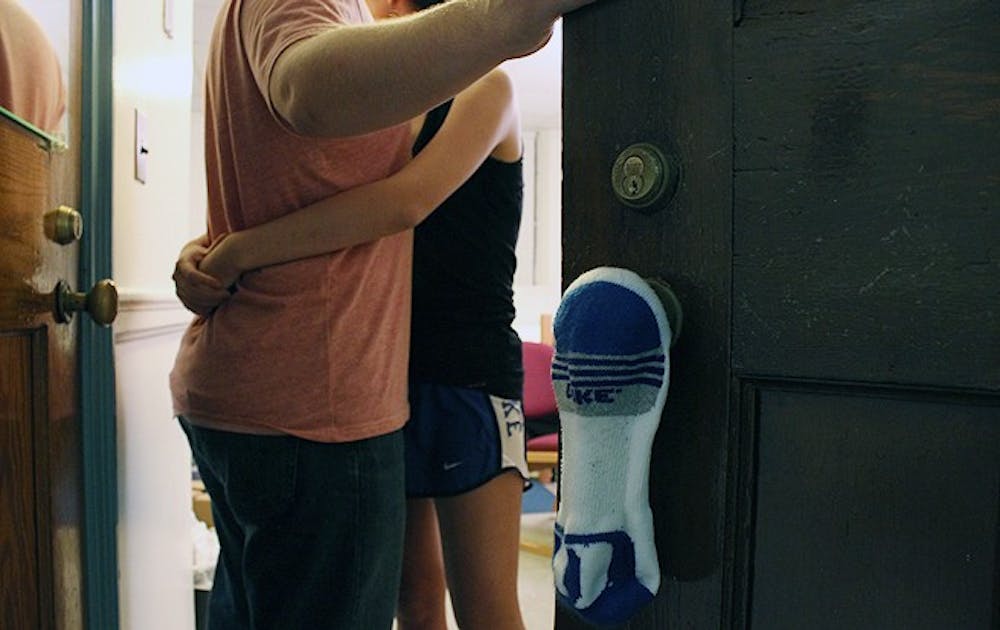When it comes to sexual health, Duke is not on top.
Duke ranked 41st in condom manufacturer Trojan’s 2012 Sexual Health Report Card—an annual study that has ranked campuses for seven years running based on their access to sexual health resources and information. Although this is an improvement from last year’s rank of 50th, the University’s current placement shows a steep decline from previous years, when Duke ranked 29th in 2010 and 10th in 2009.
The study, conducted by independent research firm Sperling’s BestPlaces, aims to use the rankings as a way to point out the state of sexual health on each college campus. The study looked at 141 universities’ student health centers and ranked each school based on their services, such as hours of operation, contraceptive availability and sexual assault programs, among others.
“One thing we’ve found that [Duke] is lacking is the amount of programs, initiatives and types of outreach programs that are being put on by the student health sector and peer groups to bring awareness to the student population,” said Bert Sperling, lead researcher of the study.
Sperling said each student health center is asked to fill out a two-page questionnaire and are then evaluated on how well they do in each category. University of Illinois at Urbana-Champaign took first place, Brown University took second and Columbia University came in third this year.
Duke is doing well across the board in providing basic sexual health services, but a lack of programming for campus-wide dialogue placed Duke lower in the overall ranking, Sperling noted. He added that as schools become better at providing sexual health information and resources, the researchers are forced to look at the tiny differences that set apart each university.
“There are lots of other schools doing a great job and the difficulty is that Duke is doing a great job, as well,” he said. “As the schools get better, the differences become smaller, and it comes down to the fine parts.”
One program that sets some colleges apart from others in the study is a sex column in the student newspaper, which Duke currently lacks. Sperling noted that there are a lot of misconceptions about sex and relationships, and a weekly column allows students to figure out “what it all means.”
Oregon State University, which was ranked 10th this year, has a sex column written by a faculty member under the name Dr. Sex. Sperling said it is a facet of the school that students find very useful.
Duke should also put on more outreach programs, like the “Let’s Talk About Sex” program that Duke currently offers, in order to improve the availability of information and resources on campus, Sperling said.
“There weren’t many of these programs compared to what we’ve seen at other schools,” he said.
Maralis Mercado, program coordinator at the Duke Student Wellness Center, noted that although the center has not changed a lot of what they have done to administer sexual health information and resources over the years, wellness center members are trying to increase their presence on campus. She added that Duke rising from 50th to 41st in the past year indicates the center’s efforts are “headed in the right direction.”
“We need to get more information on what students want and need regarding sexual health,” Mercado wrote in an email Wednesday. “The more information we have, the better able we are to serve the entire Duke community.”
Freshman Rebecca Ponce de Leon said she feels information and resources are available, but they are not “in your face” all the time.
“If it were more in the public eye, it wouldn’t matter because if you needed it, you would know where to get it,” she said.
Junior Natasha Anasi said the University should post more visual reminders, like posters, with information about sex on campus.
DUWELL does offer events on sexual health issues, but these outreach programs are not usually focused on a set topic, Mercado said.
“We offer information, events and training on sexual and reproductive health that can be tailored and are based on student request,” she noted. “Many of our programs have been broad so all are able to attend and acquire the resources they are looking for.”
Mercado added that she would like to see Duke’s ranking improve, which is part of the strategic plan of the Sexual Health Advisory Committee, which was created this year. SHAC will consist of representatives from the DUWELL, the Women’s Center, Counseling and Psychological Services, the Center for Lesbian, Gay, Bisexual and Transgender life, Student Health and Housing, Dining and Residence Life.
Representatives of SHAC will come together to assess and address issues relating to sexual and reproductive health, which includes discussion about sexual and non-sexual relationships, sexual assault and consent, among other topics.
Regardless of the rankings, the study’s main intent is to start a dialogue on campus about making healthy sexual choices, said Esther Walsh, a representative from Trojan.
“Our goal is to spark dialogue and inspire change,” she said. “It’s about keeping action, encouraging conversation and not shying away from the topic and sweeping it under the rug.”
Get The Chronicle straight to your inbox
Signup for our weekly newsletter. Cancel at any time.

